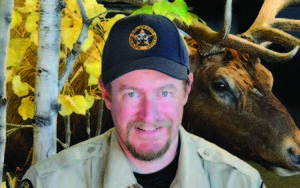Aaron Berscheid is a district wildlife officer for Colorado Parks and Wildlife. Aaron covers the ìwildî side of Northeast El Paso County, including Black Forest, Falcon, Peyton and Calhan. He also covers some of Elbert County, north of U.S. Highway 24 and south of State Highway 86, including the towns of Elbert, Kiowa, Ramah, Simla, Matheson and a small portion of the Limon area.
Itís important we stay vigilant and help stop the spread of highly pathogenic Avian Influenza, as it jumps from birds to mammals.Last spring, I asked everyone to remove their bird feeders because of the threat of Highly Pathogenic Avian Influenza, or HPAI, which was spreading through U.S. bird populations. Well, there is news on the HPAI front and itís not good. I want you all to be aware so you can help stop the spread. And maybe even protect yourselves from HPAI.Avian flu is a disease that primarily affects wild bird populations and domestic birds. It had been detected in Colorado in March 2022, and experts were worried it could jump to mammals.If youíve been watching the headlines, you know it hit Colorado birds hard, most heavily impacting waterfowl populations. Many Canada geese and snow geese have died throughout the state, especially along the Arkansas River and South Platte areas out east where these birds congregate the most while migrating.†I want everyone to know HPAI has been confirmed in El Paso County, too. I have personally seen a few geese that have tested positive.HPAI also has heavily impacted the poultry industry, and can be detrimental to privately owned chickens, turkeys and ducks.†The latest news is where HPAI is spreading now. It has been detected in multiple mammal species in Colorado and many other states.A bear in Huerfano County was euthanized because of abnormal behavior that was most likely due to a neurological disease or head injury. It was determined that the bear should be necropsied (autopsy for animals) and tested to find out the cause of the health issue. It was determined that the bear had HPAI.A mountain lion that was found dead outside of Gunnison city limits was also tested because it showed similar signs to many feral cats that have tested positive for HPAI. The mountain lion also tested positive for HPAI.†Positive tests have been found in many other mammal species throughout the U.S., including skunks, foxes, black bears, grizzly bears, bobcats, coyotes and raccoons, to name a few. Most of these animals contract HPAI when they scavenge dead birds infected with the disease.†Now, I donít say all this to panic you but to inform you that it is possible for humans to contract HPAI by coming in contact with an infected animal or bird, as HPAI has jumped from birds to mammals.†I donít want you to be scared, but to be prepared. So here is what you should do if you encounter a sick or injured animal.†If you see an animal or bird that is injured or sick, DO NOT TOUCH IT! Take a video from a safe distance and report the animal to our office ó 719-227-5200 ó or Colorado State Patrol nonemergency line ó 719-544-2424. Our office will determine the response needed for the animal.†Officers or responding personnel will be wearing proper safety equipment (personal protective equipment). Not every animal or bird that you see sick or injured will have HPAI, but it is important to remain cautious.†The following link is another article about HPAI from CPW, and it has multiple links to the CDC website and other HPAI resources.https://cpw.state.co.us/aboutus/Pages/News-Release-Details.aspx?NewsID=3752One way we can all help stop the spread of HPAI is to take down your bird feeders. I recommended that you do not feed any birds, including song birds, out of feeders in your yard. Congregating birds on a feeder increases the likelihood of the transmission of any disease, especially HPAI.†In the coming months, Iíll share more of those stories as I write about wildlife issues in our community: Got a question, problem or column idea, please email me at aaron.berscheid@state.co.us or call me at 719-227-5231.†I might even answer your question in a future installment of ìWildlife Matters.î





